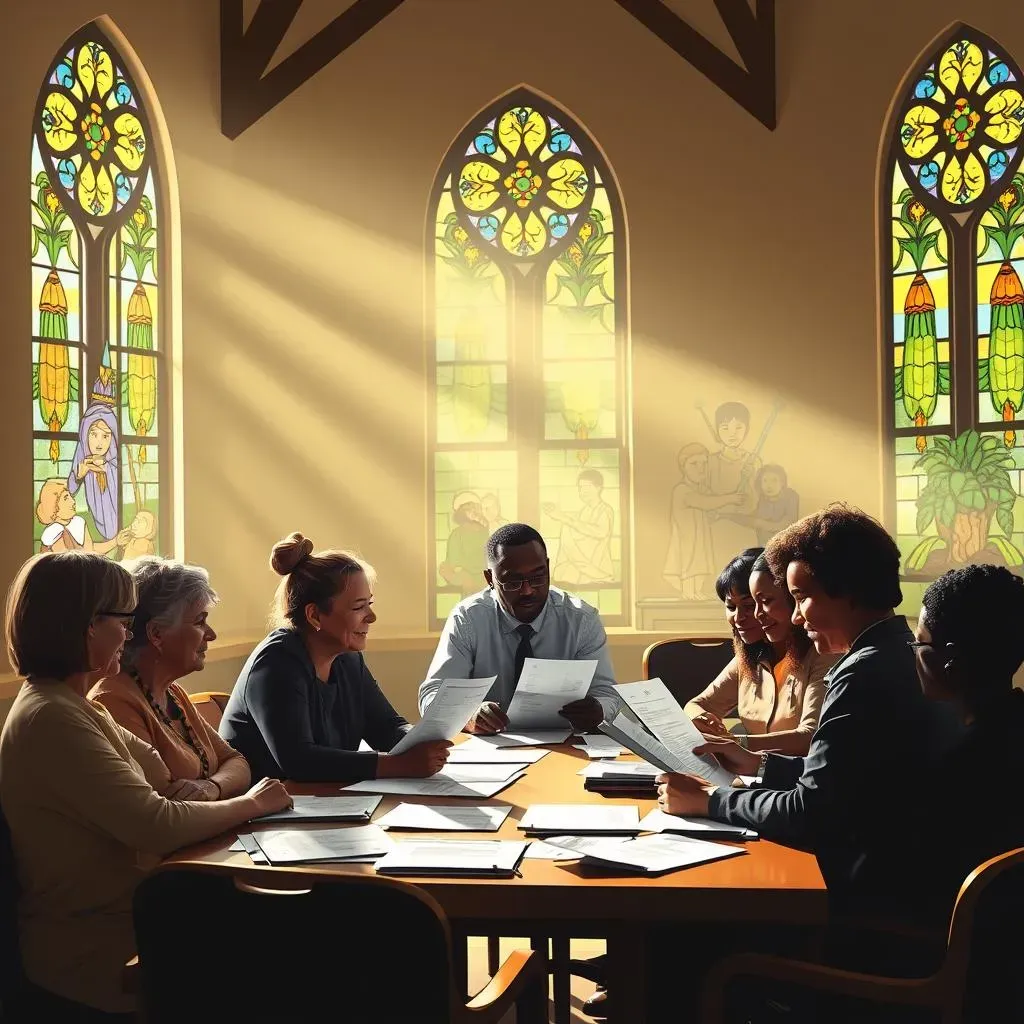Table of Contents
Is your church facing financial challenges in pursuing vital projects or programs? Are you looking for sustainable ways to fund your mission? Then look no further! This comprehensive guide will equip you with the knowledge and strategies needed to master church fundraising through grant writing. We'll explore the world of grant opportunities specifically designed for faith-based organizations, guiding you through the process of identifying suitable grants, crafting compelling proposals, and effectively managing awarded funds. Forget struggling to make ends meet; learn how to leverage grant writing to unlock crucial funding for your church's initiatives. We'll cover everything from understanding different grant types and finding the right funding sources to writing a persuasive narrative that showcases your church's impact and managing the funds responsibly. By the end of this article, you'll have a clear roadmap to navigate the world of church fundraising through grant writing, empowering your church to achieve its goals and strengthen its community outreach. Let's embark on this journey together and unlock the financial potential that awaits your church!
Understanding Church Fundraising Through Grant Writing

Understanding Church Fundraising Through Grant Writing
What are Grants?
Think of grants as gifts of money from organizations that want to support good causes. These organizations, often foundations or government agencies, provide funding for projects they believe will benefit the community. For churches, this could mean funding for building renovations, youth programs, mission trips, or community outreach initiatives. Securing grants can significantly reduce the financial burden on your congregation, allowing you to focus on your core mission. It's like finding a hidden treasure chest filled with resources to help your church thrive!
Many churches overlook this fantastic funding source. Don't let that be you! A little research and strategic planning can unlock significant opportunities. The key is to understand what grant-makers are looking for and tailoring your application to match their priorities. Think of it as a conversation—you're telling your story and showing how your project aligns with their goals.
- Grants can fund building projects.
- Grants can support youth programs.
- Grants can finance mission trips.
Types of Church Grants
There's a whole world of grant opportunities out there! Some grants focus on specific religious causes, while others support broader community development projects. You might find grants specifically for building repairs, youth ministry initiatives, or even disaster relief efforts. Others might be more general and fund projects with a strong community impact, regardless of the religious affiliation. It's about finding the right fit for your church's specific needs. Think of it as shopping for the perfect pair of shoes—you want to find the ones that fit perfectly and support your journey.
Researching different grant-making organizations is key. Some focus on national initiatives, while others concentrate on local or regional projects. Consider your church's size and the scope of your project. A small church might find more success applying for local grants, while a larger organization might be better positioned to apply for national funding. Knowing your audience is half the battle. It's like choosing the right platform to share your message—you want to reach the people most likely to support your cause.
Grant Type | Focus | Example |
|---|---|---|
Religious Grants | Specific religious causes | Funding for a new church building |
Community Grants | Broader community impact | Funding for a food bank run by the church |
Finding the Right Grant
Finding the perfect grant is like finding a needle in a haystack—but with a map, it becomes much easier! Start by identifying your church's needs and priorities. What projects are you hoping to fund? Once you've defined your goals, you can start searching for grants that align with your church's mission and the specific needs of your community. There are many online resources that can help you search for grants, and many organizations offer grant-writing support for churches.
Remember that it's a numbers game. Don't get discouraged if you don't get funding from your first application. Grant writing is a skill that takes time and practice to master. Keep refining your proposals, and keep searching for new opportunities. You'll get better with each application, and eventually, you'll find the perfect grant to support your church's mission. And who knows, maybe you'll even discover hidden opportunities that you never even knew existed! Think of each application as a step forward in achieving your church's financial goals.
Church fundraising FAQs Fundraising ideas for small churches
Crafting a Winning Grant Proposal for Church Fundraising

Crafting a Winning Grant Proposal for Church Fundraising
Understanding the Proposal Process
So, you're ready to dive into grant writing for your church? Awesome! Think of a grant proposal as your church's best sales pitch – a compelling story showcasing your needs and how the grant will help you achieve amazing things. It's not just about asking for money; it's about demonstrating your church's value and impact on the community. A well-written proposal clearly articulates your vision, strategy, and how you'll measure success. It's a roadmap to show grant-makers why your church deserves their investment.
Before you even start writing, take some time to understand the specific grant guidelines. Every grant-making organization has its own requirements and preferences. Don't rush into writing – carefully review the application instructions, deadlines, and any specific criteria they’ve set. This initial step will save you a lot of time and effort down the road. Make sure your proposal is a perfect fit for the specific grant you’re applying for!
- Carefully review the grant guidelines.
- Understand the specific requirements.
- Pay attention to deadlines and criteria.
Key Components of a Winning Proposal
A winning grant proposal is like a well-structured sermon—it has a clear beginning, middle, and end. It needs a captivating introduction (your cover letter and executive summary), a strong body (the statement of need, project description, and methodology), and a convincing conclusion (your budget and evaluation plan). Each section plays a critical role in persuading the grant-maker to support your cause. Think of each section as a building block, creating a solid foundation for your proposal.
Your statement of need is crucial. Clearly define the problem your church is addressing and provide concrete evidence of its impact on the community. Use data, statistics, and real-life examples to illustrate the urgency and significance of your project. Don't just tell them about the problem; *show* them. This is where a compelling narrative really shines. Think of it as painting a vivid picture of the need, making it relatable and impactful.
Section | Purpose | Key Elements |
|---|---|---|
Cover Letter | First impression | Brief summary, church mission |
Executive Summary | Overview | Problem, solution, budget |
Statement of Need | Problem definition | Data, statistics, impact |
Show, Don't Just Tell
Now, let's talk about storytelling. Grant-makers aren't just looking at numbers; they want to connect with your church's mission. Use vivid language to paint a picture of your church's impact on people's lives. Share inspiring stories of how your church has helped the community, and how this grant will enable you to do even more. Make them feel the passion and dedication behind your work. It's about connecting with the human element, not just the financial aspects.
Remember to be specific. Avoid vague generalizations; instead, use concrete examples to illustrate your points. Quantify your achievements whenever possible. For example, instead of saying "We helped many people," say "We provided food to 500 families in need last year." Numbers add weight to your arguments and make your impact more tangible. This also helps you demonstrate your accountability and transparency.
- Use compelling stories and examples.
- Provide quantifiable results.
- Show your passion and dedication.
Submitting Your Grant Proposal and Managing Church Fundraising Through Grants

Submitting Your Grant Proposal and Managing Church Fundraising Through Grants
The Grant Submission Process
Submitting your grant proposal is the culmination of your hard work. Make sure you follow the instructions carefully! Pay close attention to deadlines—missing a deadline is a common reason for rejection. Double-check your application for any errors or missing information. A well-presented proposal shows professionalism and attention to detail. Submitting your proposal with confidence is key.
After submitting, don't just sit back and wait. Many grant-making organizations appreciate a follow-up. This shows your continued interest and commitment to your project. A brief, polite email a few weeks after the deadline is often appropriate. It's a chance to reiterate your church’s dedication and reaffirm your proposal's merits.
- Submit before the deadline.
- Proofread carefully for errors.
- Consider a polite follow-up.
Managing Awarded Funds
Congratulations! Your church has received a grant. Now, it's time for responsible management. Create a clear budget outlining how you'll use the funds. This ensures transparency and accountability. Regularly track your expenses and keep accurate records. This will be important when it comes to reporting your progress to the grant-maker.
Remember, grant funding often comes with reporting requirements. These reports track your progress and demonstrate how the grant is impacting your church and its community. Submit these reports on time and accurately. This demonstrates your responsible use of the funds and could help your church secure future grants. Transparency is key to maintaining a positive relationship with grant-makers.
Task | Action | Timeline |
|---|---|---|
Budgeting | Create a detailed budget | Immediately after grant award |
Tracking | Monitor expenses regularly | Ongoing |
Reporting | Submit progress reports on time | As per grant agreement |
